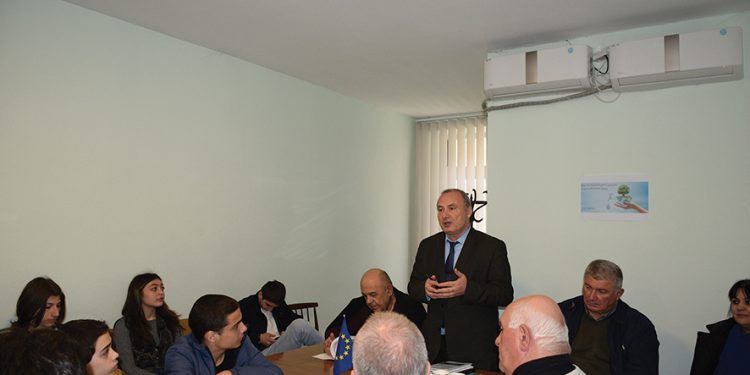To recognize the International Day of Protection of Water Resources, the Tsotne Mirtskhulava Water Management Institute of the Georgian Technical University (GTU) and the Organization of the Economic and Social Council of the United Nations (ECOSOC) of the consultative status of Ecocenter for Environmental Protection (Ecocenter), held a scientific seminar on March 22.
With the motto, “Water – life, pleasure, nature,” students and teachers of Tbilisi public and private schools No221, No159, No63, No128 (GEO SKY SCHOOL and “Green School”), specialists of the Ministry of Environment Protection and Agriculture of Georgia, and LLC “Georgian Amelioration” were invited to join the celebration. Guests from Armenia counted Professor Oganes Tokmajian, Mamuka Jangavadze, founder of “Future Technologies” LLC, and Director Davit Jorbenadze. Guests were also invited from the Office of the Permanent Coordinator of the United Nations in Georgia.
The scientific seminar was opened by the director of the Tsotne Mirtskhulava Water Management Institute, academician, doctor of technical sciences, and professor, Givi Gavardashvili addressed.
“International Water Day was established by the UN Assembly in 1993, and this year is its 30th anniversary,” noted Prof. Gavardashvili.
“Indeed, today is a remarkable day for our planet and, of course, for our country, including our institute, which was established in 1925 as the Transcaucasian Water Management Institute, and was officially registered in 1929.
“During the 94 years of its operation, the institute changed its name many times, it was the Transcaucasian Water Management Institute, then the Institute of Hydrotechnics and Melioration, the Institute of Water Management and Engineering Ecology of the National Academy of Sciences of Georgia, then, after the reforms, the Institute of Water Management of the Georgian National Academy of Sciences, and finally the Tsotne Mirtskhulava Water Management Institute of GTU.
“The institute can be called the alma mater of water resources studies, environmental protection, engineering ecology, hydromelioration and reliability and risk studies of hydrotechnical structures,” Gavardashvili said.
“National and international scientists such as academicians Tsotne Mirtskhulava, Otar Natishvili, professors Nina Varazashvili, professor Aleksandre Didebulidze, one of the founders of GTU, professor Ioseb Buachidze are actively working in the scientific study of water resources, with them university rector, 1958-1973, Mikheil Gagoshidze, the first Georgian director of the Water Management Institute, 7th in rank, Tamaz Zhordania (Deputy Minister of Construction in 1981-1987), – Giorgi Voinich-Sianozhenski, Zurab Eristavi (Deputy Head of the Water Management Division), and Levan Kiknadze (head of the division in the Ministry of Construction),” he noted.
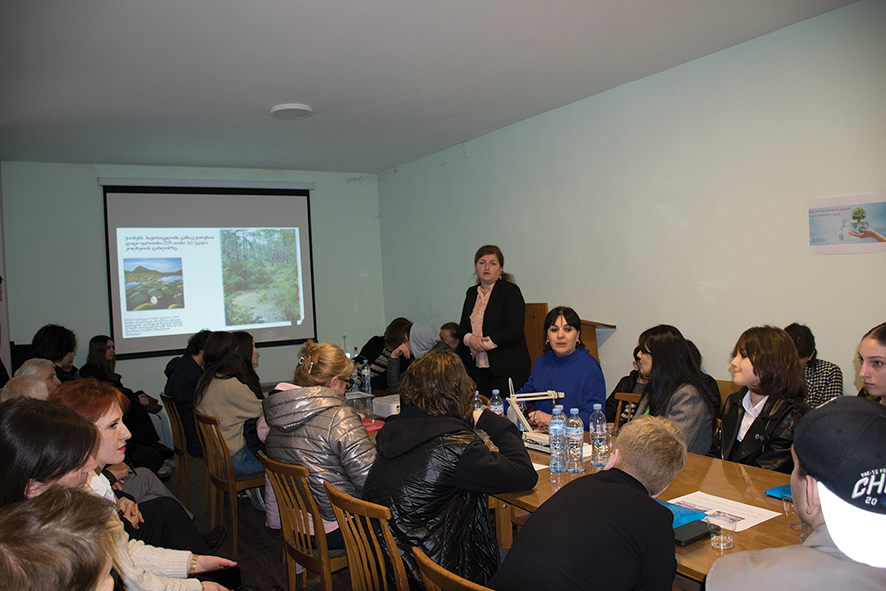
“The institute is currently working on a budget topic, ‘Integrated management of water resources taking into account climate change,’ which echoes the directives of UNESCO’s 8th program, among which the motto – ‘The security of water resources in the XXI century of the world’ is one of the main themes.
“One of the directions in this topic is the quality of drinking water and the development of the methodology of rational use. Here, we mean to lay the foundation for the use of technical water in our country, by which we mean that used for watering lawns and washing cars, not drinking water. This requires the preparation of a normative document, as well as the creation of a new economic network for its technical implementation, which will lead to greater economy in water use,” Gavardashvili highlighted.
“The second direction – the majority of high-rise dams in Georgia are built in the mountain and mountain front landscapes, where water reservoirs are located in the catchment basins of rivers. Erosion, floods, landslides and avalanches are actively seen in these places. As such, it is necessary to build active gullies with innovative environmental protection hydrotechnical structures. We have already taken the first steps in this direction, building an innovative snow avalanche structure in the alpine zone at 2,538 meters above sea level in Gudauri, and, to regulate Debris flow, we built a Debris flow regulation elastic Barrage in channel riverbed of the Kvemo Mleti River, 1,650 meters above sea level.
“At the same time, we are training young staff, which is evidenced by the successful defense of the dissertations of four of our employees at the Faculty of Construction in 2022. Many thanks to the Rector of the Georgian Technical University Professor Davit Gurgenidze for his help and cooperation,” Gavardashvili concluded.
During the celebratory seminar, Head of the Institute’s Natural Hazards and the Environment department, academic doctor of Geography, chief scientist Robert Diakonidze introduced the attending public to the role of natural disasters in the case of mechanical pollution of water resources; Head of the Seas and Basins Department of Water Management at the Institute of Georgian Technical University, Chief Scientist Irina Iordanishvili, introduced the guests to the geomorphological features of the territory of Georgia, which determine the rich and diverse types of water resources. She noted that on the 69,700 square kilometer territory of Georgia, there are 26,060 rivers, among which 7,951 are in eastern, and 18,109 are in western Georgia; 860 lakes, 20 large irrigation canals, up to 60 glaciers, and numerous underground waters, artesian pools, thermal and mineral waters.
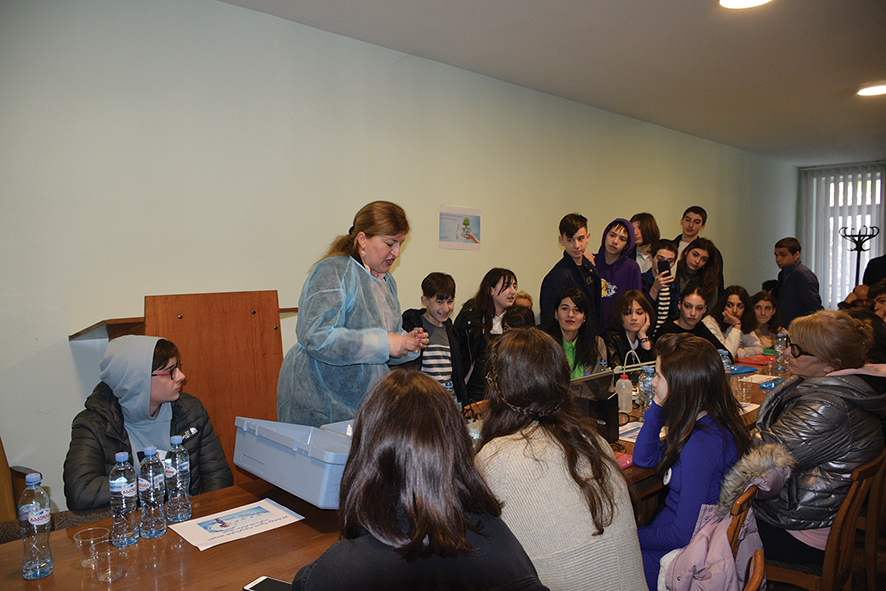
“There are 51 water reservoirs in the territory of Georgia, constructed in mountain and foothill regions is due to their significant water resources and their high energy potential,” Iordanishvili noted. “These reservoirs in the headwaters of rivers at high points are highly efficient and have a low negative impact on the environment. They enrich natural landscapes and encourage recreation and tourism, and increase agricultural productivity by irrigating land.”
Chief Scientist Shorena Kupreishvili, Head of the Irrigation and Drainage Department and academic doctor, spoke to the seminar guests about the wetlands of Kolkheti.
“The total area of wetlands of Kolkheti is some 225 thousand hectares, on which it is necessary to carry out complex capital reclamation works to best utilize the space agriculture. At the same time, the full and effective exploitation of the Kolkheti region significantly depends on the widespread hydrographic network, riverbeds (both natural and artificial) and the regulation of the runoff formed during the harvesting of intensive precipitation.
“To develop a system of complex measures for the reclamation of Kolkheti’s heavy wetlands, important research works have been carried out by many scientific institutions, a challenge met by the Tsotne Mirtskhulava Water Management Institute of Georgian Technical University, under the leadership of Professor Givi Gavardashvili,” Kupreishvili noted.
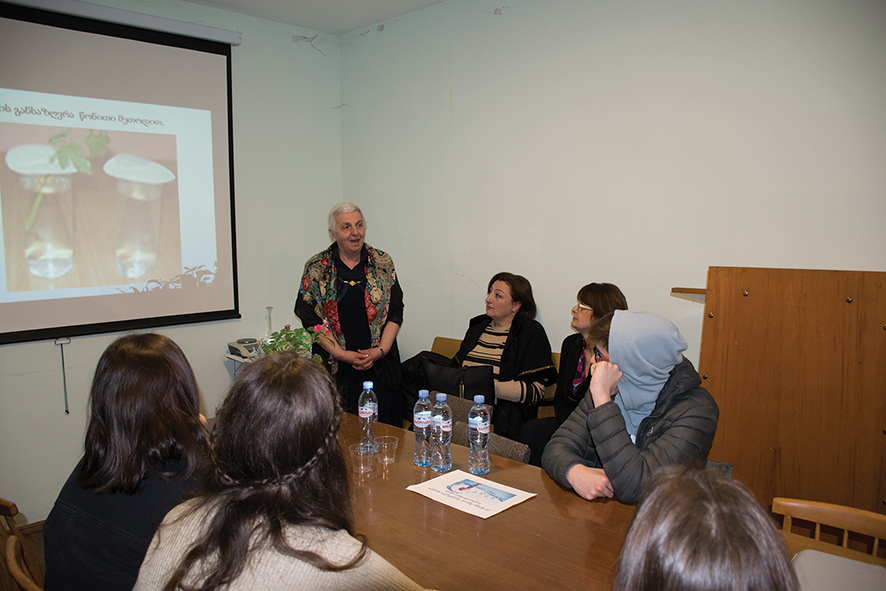
Spotlighted during the seminar was the arrangement of the field stent for the study of the innovative three-way combined drainage (Georgia patent with certificate # GE P 2005, 3573 B) was carried out under the grant project No40/35 – “Research of new alternative drainage measures for the Kolkheti plain on the example of three-way combined drainage” with funding (doctoral student Maka Guguchia; scientific supervisor, academician Givi Gavardashvili 2013-2014). To carry out field experiments on the three-way combined drainage, a research polygon was organized at the test base of Didi Jikhaishi Agrarian College of the Samtredia district of the Technical University of Georgia. The conducted studies and obtained results showed that since 2013, the drainage has worked and there has been no swamping in the entrance area of the yard. The research conducted by Ana Gavardashvili in the direction of water resources management is also important – on the Black Sea, and Natia Gavardashvili – on the Vere Gorge, whose project proposals won a grant competition.
Tamriko Supatashvili, a scientific employee of the innovative group of the Institute, and an academician doctor of agroengineering, at the seminar presented a report on the topic: “Water quality control.”
She talked about basic control parameters in water; the physical, chemical, and physico-chemical characteristics, then showed the schoolchildren present practical examples – experiments to determine the acidity in water by means of a pH meter (by an Israeli company) and how to determine iron content by means of a portable spectrophotometer (by HACH, USA).
Olga Kharaishvili, candidate of technical sciences and senior scientist gave a speech to the school students, noting that water is an essential vital component for normal plant development.
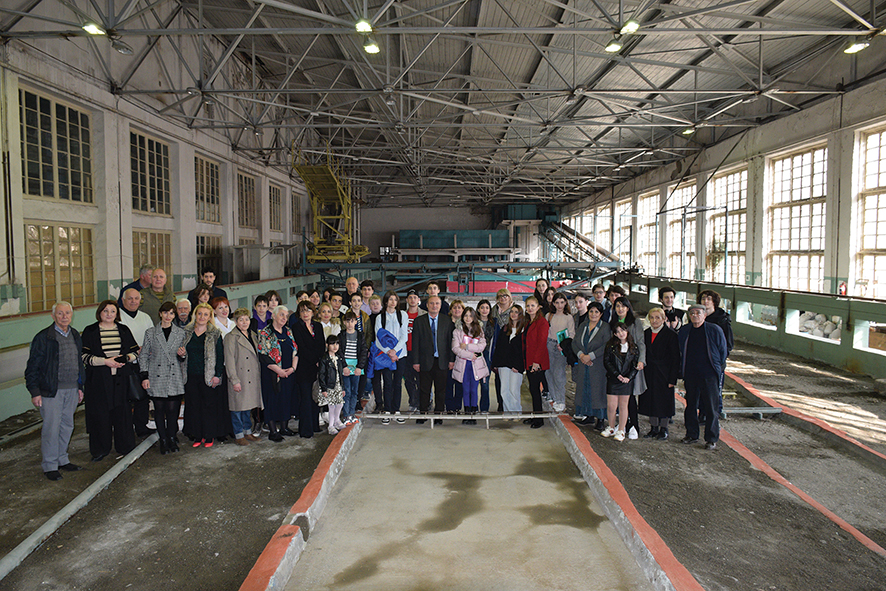
“Water helps photosynthesis, absorption of nutrients, and the maintenance of cell turgor,” she told them.
“The plant mainly evaporates water from its leaves. Through the gills (gill transpiration), steam is released from the mesophyll cells into the atmosphere. Water evaporates from the epidermis (peridermal transpiration). Transpiration ensures the movement of water and substances dissolved in it from the roots to the leaves. The plant’s ability to evaporate water protects the plant from overheating. Transpiration changes under the influence of environmental factors. The amount of transpiration is determined by the intensity of transpiration. Determining the intensity of transpiration by weight method is an important process,” she said.
To demonstrate transpiration, she did an experiment, with a flask, and a weighed rubber stopper with a plant leaf attached. The result showed the intensity of transpiration – that 42 g of water was evaporated by the plant leaf in 38 minutes.
At the next seminar, Professor Oganes Tokmajian, director of the Scientific Research Institute of Water Resources Problems and Hydrotechnical Structures from Armenia, Mamuka Jangavadze, the founder of “Future Technologies” LLC, and Inga Arindauli, a specialist of “Georgian Amelioration” Ltd, etc., spoke.
Academician Givi Gavardashvili rounded up the event by once again congratulating the attending public and schoolchildren on International Water Day and wishing them many successes in the rational use of water, one of the main natural resources of the country. In the hydrotechnical laboratory of the institute, the participants of the seminar took a group photo, and school students were given souvenirs and certificates of participation in the seminar.
Translated by Ketevan Shkirtladze

